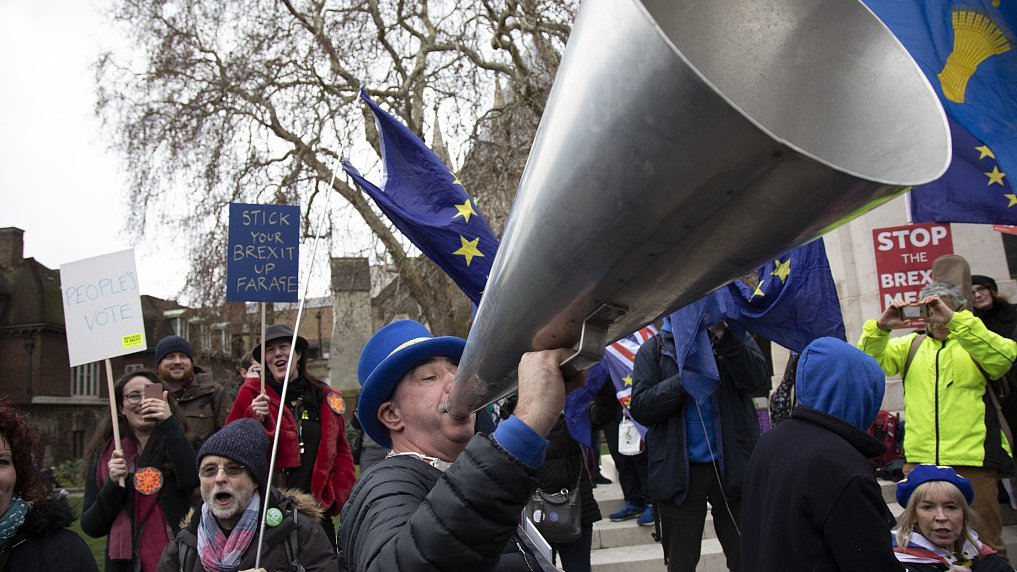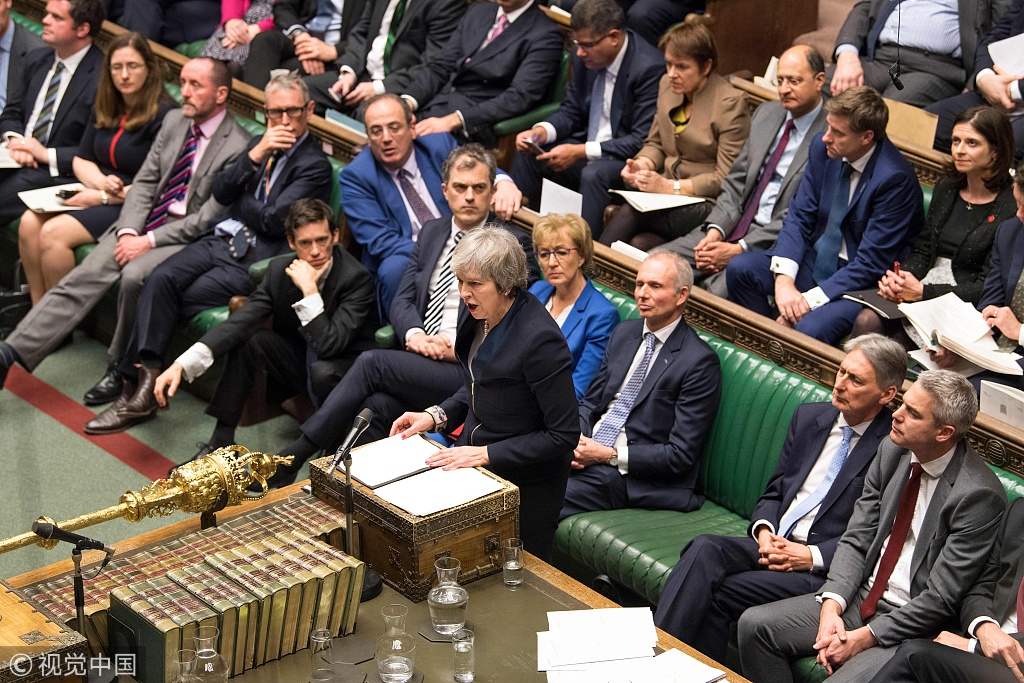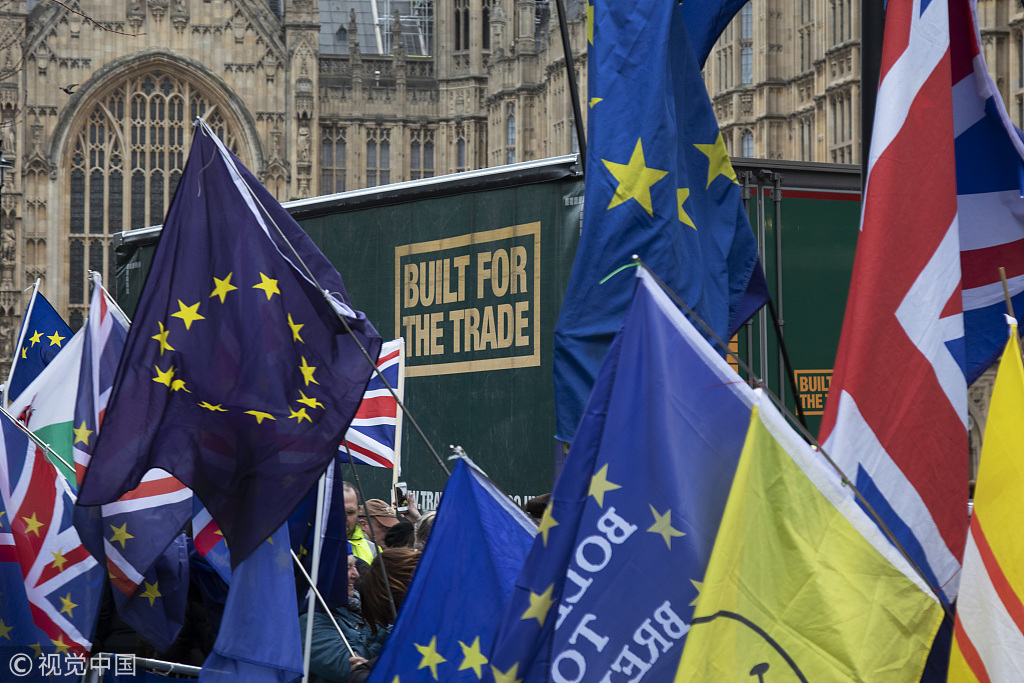
Opinions
17:51, 16-Jan-2019
Opinion: No-deal Brexit would not be a ‘disaster’
Updated
19:49, 17-Jan-2019
Martin Jay

Editor's note: Martin Jay is an award-winning journalist based in Beirut, his career as a foreign correspondent includes working for several major international media. The article reflects the author's opinion, and not necessarily the views of CGTN.
Theresa May's crushing defeat in the British parliament to win support for her own "withdrawal agreement" – a key part of Britain leaving the EU (Brexit) – does tend to leave more questions than answers.
Indeed, the British PM did look almost relieved when the vote was delivered as some in her cabal of aides and friends believe that now she has the ammunition in her bag to go to Brussels and bang her fist on the table of the somewhat stubborn, if not buffoon-like, Jean-Claude Junker.
Junker erroneously believes that he and his colleagues hold all the cards in what is essentially a bluffing game.

Britain's Prime Minister Theresa May (C) speaks in the House of Commons in London ahead of the meaningful vote on the Government's Brexit deal, January 15, 2019./VCG Photo
Britain's Prime Minister Theresa May (C) speaks in the House of Commons in London ahead of the meaningful vote on the Government's Brexit deal, January 15, 2019./VCG Photo
But the message that May will deliver to him will be a confusing one and now, annoyingly for the hardcore Brexiteers in her own party, much will depend on Mr. Junker's next move. May herself seems determined to avoid a second referendum scenario and perhaps equally a "no deal" exit on March 29.
In the UK, most analysts agree that parliament is absolutely determined to avoid a no deal scenario and their vote to reject her own proposed deal was a message which resonated with that principle. And yet, in some ways, the crisis which it has sparked has made a no-deal exit more of a reality.
All eyes now are on Brussels as Mrs. May always banked on what she believed was a lot of support and goodwill from the euro elite there. But in the coming weeks, she will almost certainly see how her so-called friends who are disingenuous at best and treacherous at worse, whose fetid agenda far from the flashbulbs and podiums, has always been to make an example out of the UK's departure for others to see.
Britain's economy, along with its own Brexit, must fail for Brussels to survive the choppy waters ahead, with far-right groups looking to be winners in the EU's own elections to be held in the summer.
The problem is one of perception. May has always been pro-EU and sees those running it as allies and friends. She struggles to see how comically corrupt the EU is as a project and the murky relationship it has with media organizations it subsidizes. And this affects the live analysis considerable. For example, the BBC is pushing the line that business leaders are talking about a “disastrous” scenario of a no deal happening, but this is the BBC which actually has a lobbying department in Brussels supporting the EU.
The reality is that Junker will give May what she asks for – an extension of probably a year – to come back with a better deal. But at a price. He is likely to agree to an extension on the basis that a second referendum is offered – the idea at least – to the people of the UK. Those in Brussels believe that a second referendum would deliver a formidable "leave" vote with a clear majority.

Anti Brexit pro-Europe demonstrators protest waving European Union and Union Jack flags in Westminster on the day of the meaningful vote when MPs will back or reject the Prime Ministers Brexit Withdrawal Agreement in London, England, United Kingdom, January 15, 2019 /VCG Photo
Anti Brexit pro-Europe demonstrators protest waving European Union and Union Jack flags in Westminster on the day of the meaningful vote when MPs will back or reject the Prime Ministers Brexit Withdrawal Agreement in London, England, United Kingdom, January 15, 2019 /VCG Photo
And May well just buy it as she could argue to her own party, if not the country, that she did it to save a no deal on March 29. Look very closely in the coming days for May to firmly state that a second referendum is out of the question, as she has done in the past.
But time is running out. If those negotiations themselves with Brussels simply don't bear fruit in the coming week or two, then Britain may well find itself heading towards the abyss with a no deal scenario after all. Pundits though don't look beyond the 29th which is really the most important point. If Britain crashes out of the EU on March 29 and the UK reverts to WTO rules, that does not mean for one moment that the EU closes its doors to negotiations.
Not at all. In fact, in my own view, this is the only way of getting a much better deal from Brussels which is to show Europe some Dunkirk spirit and keep a stiff upper lip. The real deal to fight for and to prepare for, will be in the months which follow March 29, where the mother of all nightmares emerges from across the English Channel for Europe: Britain's economy, bruised and battered, survives the “crash” and begins to emerge more dynamic, vibrant and confident as it rebrands itself as a new economy no longer held back by EU legislation and Europe's foibles.
The mistake that both May and Junker will make is that a second referendum is a solution to the impasse. In reality, it may be a rallying call from within her own party (and at least half of the opposition) to fight even more than before for a better Brexit deal, even a no deal, as there is a real chance that a fiasco of a second vote might backfire. No deal is looking more and more like the only deal, in fact.
(If you want to contribute and have specific expertise, please contact us at opinions@cgtn.com.)

SITEMAP
Copyright © 2018 CGTN. Beijing ICP prepared NO.16065310-3
Copyright © 2018 CGTN. Beijing ICP prepared NO.16065310-3